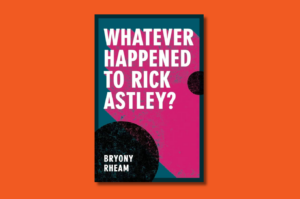
Every month, we compile a list of reads from around the Internet that we find illuminating. For January, we chose eight pieces. For February, we picked fourteen pieces. For March, we have settled on nine. They include fiction pieces that we believe are among the best we will see this year, essays that are strong contributions to some of our ongoing conversations on literary politics and history, and poetry whose simplicity reinforces its power.
While numbered, this list is unranked.
*****
1. “A Door Ajar” | By Sibongile Fisher | Fiction | Short Story Day Africa Anthology
Sibongile Fisher’s 2016 Short Story Day Africa Prize-winning story is a product of a riotous imagination. It describes, in a first-person so third-person, a family—and community—of females for whom life is an tough mix of violence, love, betrayal, tradition, and an insatiable thirst for home. “She grabbed the wailing infant and threw it against the wall,” it begins, and the quirkiness never lets off. We are waylaid with sentence after sentence of resonating potrayal: “She looked at her mother, MmaLeru, who was cleaning her up, handling her vulva as though it were a damaged chest of useless memories;” “Her pupils…had a blue ring around them, and when she gazed into a distance, they looked like cosmic bonfires;” “Her body, a lighter shade than her mother’s, and more frail, looked like an empty island waiting to be claimed, with dead fish at its shores;” “This city has fallen to its knees at the sight of my beauty;” “It is evening, and the wind is saying something.” The narrator, a woman who is “a darker shade of blue-black, silver-black,” is a wild mind: “There is something about men who seek Christ that warms my blood. Sometimes before the sex, I make them recite the Hail Mary or the Apostles’ Creed.” And it is a wildness obsessed with religious symbolism: “On the night it happened, she found my lover and me at the feet of Christ. I was on top of him and he was lying there, just right.” The setting is a matriarchal culture as remarkable for its violent normality as it is for its beautiful placement of femaleness: “Home – here, men are the ones who always leave, never the women and that is why we never call them by their names. We call them by their roles, and if you don’t know, you always refer to him as monna, which simply means man. The women are never called by their roles. Every woman who undergoes tsosetso is called by her name.” This is a contender for the finest African short fiction of 2017.
2. White A$$holes | Transition Magazine | Issue 122
With its provocative title, White A$$holes, Transition magazine’s Issue 122 tackles the xenophobic and human rights-reversing atmosphere ignited by US President Donald Trump, while also celebrating the 40th anniversary of the 1977 miniseries, Roots. Its cover bears a depiction of Trump and a hilarious fake tweet by him about the publication. “In an era that many had wished to call postracial,” states the editorial’s flyer. “With a new U.S. Administration empowering xenophobic tendencies and threatening to reverse decades of progress towards civil rights, contributors call for continued vigilance and aggressive dissent if we expect the arc to continue to bend towards justice.” The issue’s 34-piece content is remarkable in that it has space for only two pieces of fiction and just one for poetry. The rest are letters and opinions, essays, artworks and a talk, a few of which are collaborations. Among the contributors are Chika Unigwe and Tope Folarin whose pieces constitute “testimony on the fallout of Trump’s election.”
3. “The Zambian ‘Afronaut’ Who Wanted To Join the Space Race” | By Namwali Serpell | Essay | The New Yorker
Namwali Serpell’s revealing profile of Edward Mukuka Nkoloso who, as Zambia gained independence from Britain in 1964 at the height of the Cold War, launched, with twelve teenagers, “a space program to beat the U.S. and the Soviet Union to the moon” is 4,900 words of heavy, multi-referential research. A “well-educated” man with “a flair for rhetoric,” Nkoloso was born in 1919, was tutored in Theology, Latin and French, was drafted to fight in World War II in Abyssinia and Burma, had returned to trouble the Northern Rhodesian colonial authorities, and had finally been “inspired by his first airplane flight” “to enter the space race” “When the pilot refused to stop the plane so that he could get out and walk on the clouds.” But Namwali does more than merely compile the facts around this “engaging if somewhat insane man” who has been labeled “an amiable lunatic,” “a court jester” and “Zambia’s village idiot.” She questions the near-unanimous questioning of Nkoloso’s eccentric idealism, pointing out how—with letters containing such lines as “We have been studying the planet through telescopes at our headquarters and are now certain Mars is populated by primitive natives”—his space program could be a satire for both colonialism and the Cold War. Namwali’s investment in this figure in Zambian history is something to take note of. In an email to Brittle Paper, she states that he will figure in her future work: talks and lectures, her forthcoming novel The Old Drift (Penguin Random House, 2018), and in a collaboration with Ghanaian filmmaker Frances Bodomo.
4. “In the Shadow of Context” | By Kola Tubosun | Essay | Enkare Review
Citing Ivor A. Richards’ 1920s experiment, in which he presented poems to his students without including the poets’ names so as to prevent their being swayed by the poets’ reputation rather than the strength of said poems, Kola Tubosun’s suggests, with examples from all over the world of how authors’ names aid or limit their chances, that the judging of literary prizes in Africa is being dictated not by the excellence of the works in contention but by the names of their authors. A model like Richards’, he writes, would be “something close enough to an objective-subjective assessment: objectivity from knowing that nothing outside of the work gave away the authors’ ‘reputation’, except for their competence or otherwise in handling the plot and style, from knowing that all that the work received would have been ranked highly or lowly on their own merit.” He weighs the Caine Prize against “the perception that the return of previous winners into the shortlist…might indicate that favouritism, intended or not, had begun to mar the selection process.” But Tubosun’s is a larger question than just objectivity in judging prizes: how, he wonders, can context which “helps to better situate the work and understand the author’s obsession with the theme” be prevented from influencing the judgement of the said work’s quality as the information provided by said context is not enclosed within the pages of the work and so can give it undue advantage over other works without interesting contexts?
5. “The Day the Sea Turned Brown” | By Tania Haberland | Poetry | Adda
Tania Haberland gives us a simple gathering at a seaside. “We sat on the half-moon verandah of my great aunt’s/ bungalow – rondavel of black volcanic rock with a straw roof,” it begins. “I felt sleepy, bored by the mundane/ the usual conversation and the continual beauty/ of sun and sea.” It is a simple but absorbing observation of water under moonlight: “It was full moon time/ and so the sea had risen to meet the sun/ the sea rose a little bit more, crept towards the shore/ passing the highest high-mark tide.” One of calculated awareness: “Everyone watched with discomfort this Caliban/ lagoon lumber towards our feet. It was not a wave/ but an oozing of liquid, like the breath of a drunk.”
6. “Tea” | By TJ Benson | Fiction | Short Story Day Africa Anthology
TJ Benson’s tale of two apprentice-porn actors in an alien country who murder their employers and, with only a “rudimentary” “grasp of English” between them, must find a way to communicate in order to avoid arrest is told with cinematic range. It opens with a multicultural scene of an actual filming: “She is Tiv and knows no English. He is German with familial connections to the Nazis. They are in a hotel room somewhere in Italy. On the bed is an assortment of sex toys. A gruff voice behind the camera orders them to take off their clothes. The girl doesn’t understand English, and a heavy-set woman in an orange buba gown whispers the translation into her ear. The boy places his finger on the girl’s cheek, testing the texture. She shivers at the touch. Chalked in white on the charcoal placard are the words, From Italy, with Love.” In plain prose that does not hide its movie influences, Benson turns this “old story. Young girl from a small village fed tales of steady employment and a high salary in Europe” into a critique of the human need for, and adaptation to, communication. The Tiv girl and German boy escape in true Hollywood heist style and after “a month of working dead-end jobs,” they find an apartment and “the girl’s English improves, and they start to grow apart” and the boy “misses the days when they could anticipate each other’s wants, those days of silence when there was no language between them, when a million things could be communicated with touch.” The story was runner-up for the 2016 Short Story Day Africa Prize.
7. “Ships in High Transit” | By Binyavanga Wainaina | Fiction | Expound
In 2005, Binyavanga published a story titled “Ships in High Transit” in the Virginia Quarterly Review, a story which was awarded the magazine’s Emily Clark Balch Prize for Short Fiction, and twelve years on, his new story in Expound bears the same title. There is a case for Binyavanga as Africa’s most innovative, and finest, crafter of English prose. A case solidified by his Granta essay in February. His new Expound story is a celebration of language, an indulgence in the possibilities of fiction, a story whose prose roams and you keep on reading not because the plot moves anywhere decisive but simply because the prose roams and won’t cease roaming. We meet this in the opening paragraph: “How many billions of sperm inhabit gay bars, and spill on dark streets in Mombasa? How does it happen that the shifty-eyed one finds its way to an egg?” And all through, there are these: “What was it about this child’s wisdom, his power to invoke ancestors, so that women would throw themselves into his bed as soon as his penis woke up and said Hello to the world?” And “How are you able to pole-vault your way to the top of the global village if you come from 3,000 years of Muslim refinement? You are held prisoner by your own historical success, by the weight of nostalgia, by the very National Monumenting of Old Town, freezing the narrow streets and turning a once evolving place into a pedestal upon which the past rests.” And “One of the boys walks towards her, managing to bounce off the balls of his feet with every stride, even in the sand.” And “He is looking out to sea, tapping his foot on the ground like a glass vase of testosterone, just waiting to be shattered. In Philadelphia, she would have been terrified of him. She would walk past, her tongue cotton wool, a non-racial smile tearing her reluctant face open.” And “Back home: there is fear so far inside fear you don’t feel it.” How does he do it without repeating himself?
8. “In Defence of Provincialism” | By Socrates Mbamalu | Essay | Bakwa
Socrates Mbamalu’s deconstruction of Chigozie Obioma’s much-challenged 2016 take on provincialism is passionate. With “Chigozie’s statement, where he says those writers concerned with provincialism are concerned with pleasing a particular base of readers, one can equally say that those concerned with explaining local words are similarly concerned with pandering to the West,” he writes. “Does the reader really need to have two sentences describing matatu even after reading that someone in the story “boarded” the matatu or paid their fare?” He goes on: “Explaining a word sometimes does more harm to the word, because, in a way, the writer gives a subjective translation of the word, which narrows the imagery and feeling for the reader. He also denies the world these words that they can be exposed to.” When he argues that “If a Western editor can’t stand five indigenous words in a page, it’s not because he thinks ‘a vivid sense’ is not being created, but rather because he himself has a political role to play. Why then should the provincial writer play any different role?” one sees how it is an understated call for established writers like Obioma to rethink their stand and push for necessary compromises.
9. “As Sales Approach the Million Mark, Is Americanah Now Adichie’s Signature Novel?” | Essay | Brittle Paper
Great artists have their signature works, the works that may not necessarily be their best but that have come to define the public perception of their images, and in this editorial, we outline how Americanah, one of “The Greatest Novels of the Twenty-First Century So Far,” is making a case for itself as Chimamanda Adichie’s signature novel. A much praised bestseller like Purple Hibiscus and Half of a Yellow Sun before it, soon to have a film adaptation like the latter, but making inroads in pop culture unlike the other two. This assessment, augmented with bookselling statistics in the light of the novel’s win of the “One Book, One New York” initiative, focuses on Adichie’s novels’ global reach rather than the question of quality and suggests that Americanah might have become the novel the most people talk about when they talk about Adichie.
*****
Read our monthly literary digests for January and February.
Read our list of the best pieces of 2016.









Otosirieze Obi-Young May 07, 2017 17:59
Thanks for reading, Hannah.